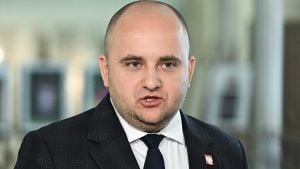The upcoming Cycling World Championships, set to take place this September in Kigali, Rwanda, have found themselves at the center of rising controversy and concern. The event, which aims to showcase cycling talent on the global stage, is overshadowed by increasing unrest related to the M23 rebel group along the Rwandan border, leading many to question the safety of both participants and spectators.
Recently, the Tour du Rwanda commenced, featuring its prologue event where 19-year-old Belgian cyclist Aldo Tailleu emerged victorious. This race has grabbed attention not only for its excitement but also because it’s viewed as a precursor to the World Championships later this year. Despite the thrilling atmosphere reported by industry insiders and cyclists, the backdrop of political turmoil raises alarms.
On Thursday, the European Parliament voted overwhelmingly to urge the European Union to suspend its partnership for resources with Rwanda, going so far as to demand the cancellation of the World Championships due to the Rwandan government's alleged support for the M23 rebels active in the neighboring Democratic Republic of Congo. "The Parliament asks to freeze military and security aid to the Rwandan armed forces. We want the complete freeze of all European aid to Rwanda and the cancellation of the World Road Championships planned for September in Kigali,” stated Hilde Vautmans, the Member of the European Parliament.
The vote's results, with 443 members supporting the motion and just four opposing it, sent shockwaves through the region and raised serious safety concerns about the planned championships. The M23 group, linked to significant violence and civilian displacement, has recently made territorial gains near Goma—an area important for mineral extraction and trade.
Despite the dire concerns articulated by European officials, UCI President David Lappartient remains firm about proceeding with the championships as initially scheduled. "There is no Plan B for the World Championships in September. This is a special event for us, as UCI celebrates its 125th anniversary. That's why we decided to go to Africa," he asserted, underscoring the importance of this event for the sport’s growth and recognition on the continent.
The contrasting viewpoints highlight the complicated nature of the situation. Many Belgian parents of young riders, including Jo Tailleu—the father of Tour du Rwanda winner Aldo Tailleu—have expressed significant anxiety about their children's safety. “We trust the team and the UCI, but hope it hasn't been the wrong choice,” Tailleu remarked, voicing concerns shared by numerous families involved.
TotalEnergies and other professional cycling teams are proceeding cautiously, with discussions underway about logistics, safety measures, and potential impacts on travel costs due to the unrest. UCI management is reportedly working with RwandAir to boost flight availability and reduce travel-related expenses for participating teams. Such discussions are imperative, especially considering some countries, such as Belgium and Denmark, have already considered sending reduced squads or even withdrawing altogether.
Adding another layer to the situation, the humanitarian crisis resulting from the M23 conflict exacerbates fears related to the Championships. United Nations reports indicate thousands have lost their lives amid clashes between the rebel forces and the Congolese army, with concerns growing over the prospect of violence spilling over borders.
The symbolic nature of the Championships could potentially position cycling as a peace ambassador, promoting friendship and solidarity, according to UCI’s official stance. Yet skepticism remains among teams and nations assessing the risk of competing under such precarious conditions.
The stakes are high for the Rwandan government and UCI as they attempt to balance the aspirations for international sporting recognition with the urgent need for regional peace and safety. The success of the Tour du Rwanda under these conditions may serve as both test and litmus for the forthcoming World Championships, prompting organizers to engage directly with local and international stakeholders.
Future dialogue among national cycling representatives concerning logistical needs will occur via Zoom meetings, ensuring an organized approach toward addressing emergent issues. Heading toward these discussions, the questions of athlete safety, travel logistics, and local cooperation will dominate the conversations as the scheduled events draw nearer.
Despite the considerable pressures facing the Rwandan government and international sporting bodies, the dream of hosting larger global events remains tantalizing. Lappartient’s ambition involves more than just cycling; it potentially includes positioning the African continent as a host for future Olympic events, seeking recognition and support for Africa’s burgeoning sports initiatives.
Looking forward, the upcoming World Cycling Championships embody more than just athletic competition—they represent complex geopolitical dynamics, the struggle for peace, and the hope of larger dreams for the Rwandan nation and beyond. Whether these ambitions can thrive amid the challenges remains to be seen as the September date edges closer.



